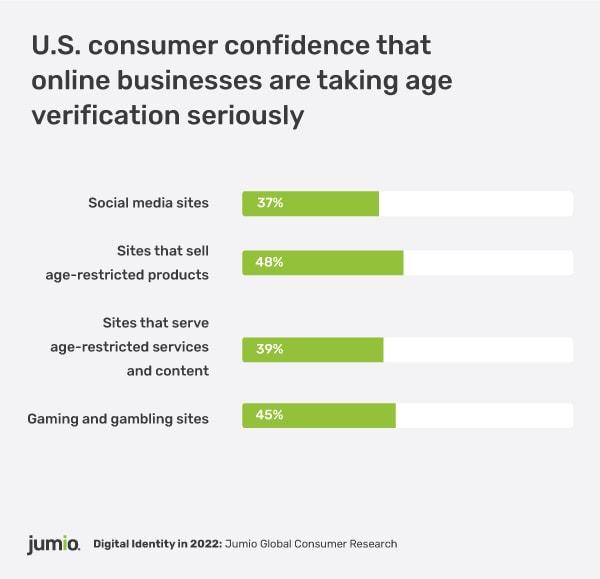
Do social media networks truly care about defending minors from mature content?
If you ask everyday Americans, the answer appears to be no.
Recent Jumio research found that only 37% of consumers expressed confidence in the commitment of social media sites to shield minors from mature content through age verification measures.
Similarly, just 39% of Americans believe sites that serve up age-restricted content and services take the issue seriously. Meanwhile, less than half (45%) say gaming and gambling sites are adequately protecting children through age verification.
These opinions are consistent across Americans whether or not they’re parents or guardians, including those with small children.

People clearly think sites that include adult-oriented content could be doing more to protect kids from their content. But is it fair to say sites don’t take child safety seriously?
Instagram, for one, recently began testing a new “social vouching” tool to ensure users are as old as they say they are. But considering the web was first popularized 30 years ago, it’s understandable for people to think Big Tech could’ve been doing much more, much sooner.
The tide does seem to be finally turning.
Lawmakers are currently mulling over the Kids Online Safety Act (KOSA) and Children’s Online Privacy Protection Act (COPPA 2.0), two bills that would be the first pieces of legislation to address online safety for children since 1998 — well before Facebook, Instagram, YouTube, Twitter and TikTok became household names. Both have received mixed sentiments from Congress – the Senate has been pushing to pass the bills, while the House contends that they compete with broader privacy legislation they have been working on.
And in September 2022, California Governor Gavin Newsom signed landmark legislation designed to protect kids online. Dubbed the California Age-Appropriate Design Code Act (CAADCA), the new legislation forces online services that might attract children to adopt a kid-first approach in the creation and delivery of their services. Yet, the law also faces considerable backlash from technology companies who argue it violates the First Amendment. Big Tech has even filed a lawsuit against the State of California to prevent the law from taking effect in 2024.
And while the bill presents legitimate privacy concerns and other practical challenges, we seem to have reached an inflection point where Big Tech allowing children to roam free about the Wild, Wild Web is no longer tolerated.
Or so you might think.
While the majority of Americans (80%) believe social media sites should make age verification a top three priority — 81% are even willing to spend some time going through an age verification check themselves, ostensibly to support this endeavor — most survey respondents (60%) agree parents and guardians bear the ultimate responsibility for protecting children from age-restricted content, services and products.
In fact, very few Americans felt that social media sites (8%), schools (9%), government (11%) or even internet service providers (12%) should be more accountable than parents and guardians in shielding children from the dangers that lurk online.
But preventing access to violent, mature and other harmful content can be a full-time job. It’s extremely difficult even for the most committed and tech-savvy of caregivers to keep up with the challenges of protecting their kids from all the dangers the web, mobile phones and apps expose them to. Even with web filtering solutions in place, kids can be incredibly savvy themselves when it comes to finding workarounds or other devices to access harmful content.
Is it time for the government to do more? Or for the industry to use its unique position to protect kids from the very online content and connections it’s responsible for in the first place? Or is this responsibility best left in the home?
While others debate who should be responsible, Jumio is focused on solving the problem at the source. Our age verification solutions make it simple for businesses like online retailers, gaming and gambling sites, and social media to verify the age and identity of their customers before they purchase products like alcohol and vapes, or before they create an account on an adult-oriented site. And with our biometric-based authentication solution, you can ensure that the person logging in is the same person who created the account, preventing kids from accessing an adult’s account.
The result is that businesses can focus on serving their target customers and earn greater trust from concerned adults.
Contact us to learn more about how Jumio can help online brands protect minors — and their business’s reputation.
For full global survey results, please click here.
